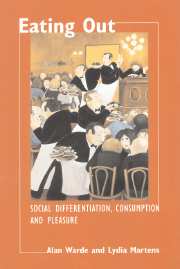Book contents
Part I - Modes of provision
Published online by Cambridge University Press: 22 September 2009
Summary
Eating is quintessentially a domestic activity. Most people still take most of their food at their place of residence. If we consider institutions like hospitals, military bases and religious and educational institutions as places of residence this is even more the case. Eating anywhere else has usually been the consequence of the requirements of travel or work. While the means of preparing meals at these different places of residence are various – upper-class households have servants and institutions have employees – most of the labour associated with the preparation of meals has, in the past, been delivered by household members. Given the prevalence of nuclear family households in the UK since early modern times, most of the labour associated with obtaining (though not growing), preparing, cooking, serving and clearing away food has been in the domestic mode. Familial social relations – personal, gendered, asymmetrical and enveloped in a discourse of care and love – have regulated food provision. Until recently the market mode has governed agricultural production and wholesale and retail distribution of ingredients, but the transformation of ingredients into food was not touched by the logic of economic exchange. However, increasingly with the manufacture of foodstuffs, typically convenience foods, and increasingly with the sale of completely pre-prepared meals by supermarkets, entire dishes have been supplied as commodities, though even these require assembly into meals in the domestic kitchen. The logic of commodification, with its general tendency to corrode personal bonds, invades yet further realms of practice.
- Type
- Chapter
- Information
- Eating OutSocial Differentiation, Consumption and Pleasure, pp. 17 - 20Publisher: Cambridge University PressPrint publication year: 2000



